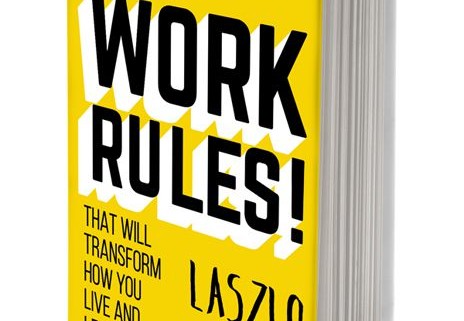Google’s 10 things to transform your team and your workplace
What you can do, starting tomorrow.
In my years at Google GOOG 2.02% I’ve noticed that some of the ideas about culture that we put into place were not that groundbreaking. But they still deserve attention.
You either believe people are fundamentally good or you don’t. If you do believe they’re good, then as an entrepreneur, a team member, a team leader, a manager, or a CEO, you should act in a way consistent with your beliefs. If people are good, then they should be free. Too many organizations and managers operate as if, absent some enlightened diktat, people are too benighted to make sound decisions and innovate.
The question is not, What management system is required to change human nature? but rather, What
is required to change the nature of work?
In each chapter of my new book I offer short lists of “work rules,” in case you want to focus on one area or another. But if you want your company to have a high-freedom environment, here are the 10 steps that will help you quickly transform your team or workplace.
1. Give your work meaning
Work consumes at least one-third of your life and half your waking hours. It can and ought to be more than a means to an end. In too many environments, a job is just a paycheck. But as Wharton professor Adam Grant’s work demonstrated, even a small connection to the people who benefit from your work not only improves productivity but also makes people happier. And everyone wants his work to have purpose. Connect it to an idea or a value that transcends the day to day and that also honestly reflects what you are doing.
2. Trust your people
If you believe human beings are fundamentally good, act like it. Be transparent and honest with your people, and give them a voice in how things work. And the only way for that to happen is if you give up a little bit of your authority, giving them space to grow into it. This may sound daunting, but in reality it’s not too risky. And if you are part of a team, make this plea to your boss: Give me a chance. Help me understand what your goals are, and let me figure out how to achieve them. Small steps like these create the trail to an ethos of ownership.
3. Hire only people who are better than you
Organizations often act as if filling jobs quickly is more important than filling jobs with the best people. Hire by committee, set objective standards in advance, never compromise, and periodically check if your new hires are better than your old ones. The proof that you are hiring well is that nine out of 10 new hires are better than you are.
4. Don’t confuse development with managing performance
In all cases, don’t rely solely on the manager to come up with an accurate picture of how people are doing. For development, solicit input from peers, even if it’s as simple as asking or sending out a short questionnaire. For performance evaluation, require managers to sit together and calibrate their assessments as a group to guarantee fairness.
5. Focus on the two tails
Put your best people under a microscope. Through a combination of circumstance, skill, and grit, they have figured out how to excel. At the same time, have compassion for your worst performers. If you’re getting hiring right, most of those who struggle do so because you’ve put them in the wrong role, not because they are inept. Help them to learn or to find new roles.
6. Be frugal and generous
Most things we do for our people cost nothing. Have vendors bring services inhouse or negotiate lunch delivery from a local sandwich shop. TGIF [all-hands meetings] and guest speakers require only a room and a microphone. Yet they result in a Brownian abundance: Googlers are constantly bumping into a new service or an intriguing discussion. Save your big checks for the times when your people are most in need, the moments of greatest tragedy and joy. Your generosity will have the most impact when someone needs emergency medical attention or when families are welcoming new members. Focusing on those most human moments underscores that your organization cares about each individual personally. And all workers will draw comfort from knowing that should they encounter one of life’s lowest or highest moments, they’ll have the strength of a larger institution behind them.
7. Pay unfairly
Ninety percent or more of the value on your teams comes from the top 10%. As a result, your best people are worth far more than your average people. They might be worth 50% more than your average people or 50 times more, but they are absolutely worth more. Make sure they feel it. Even if you don’t have the financial resources to provide huge differences in pay, providing greater differences will mean something.
8. Nudge
Look around you right now and discover how your environment is nudging you and those around you already. Is it easy to see other people and connect? Are the least-healthy snacks in your refrigerator at eye level? When you email or text your colleagues and friends, is it to share good news or snark? We are all constantly nudged by our environment and nudging those around us. Use that fact to make yourself and your teams happier and more productive. Arrange your physical space in a way that encourages behaviors you want: If you need people to collaborate and are stuck with cubicles, knock down the walls. Be thoughtful in how you send messages to your teams. Share data about what is going right, such as the number of people volunteering with local charities, to encourage others to get involved. You’ll be surprised by how different the same place can feel.
9. Manage the rising expectations
You’ll trip up sometimes and need to take backward steps. Be prepared to eat your goji pie. Knowing that, tell people around you that you’ll be experimenting with ideas before you start experimenting. That will help transform them from critics to supporters, and they’ll extend you the benefit of the doubt if things go awry.
10. Enjoy! And then go back to No. 1 and start again
This isn’t a one-time effort. Building a great culture and environment requires constant learning and renewal. Don’t worry about trying to do everything at once. Experiment with one idea or with a dozen, learn from the experiment, tweak the program, and try again. What’s beautiful about this approach is that a great environment is a self-reinforcing one: All these efforts support one another and together create an organization that is creative, fun, hardworking, and highly productive. If you believe people are good, then live your beliefs through your work.
—
Excerpted from “Work Rules!,” to be published in April 2015 by Twelve Books, an imprint of Hachette Book Group. Copyright © 2015 by Laszlo Bock, SVP of people operations at Google.




Plaats een Reactie
Meepraten?Draag gerust bij!